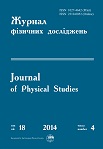DOI: https://doi.org/10.30970/jps.02.81
THE SELF-CONSISTENT THEORY OF DELOCALIZATION OF A QUANTUM PARTICLE IN A RANDOM FIELD

|
Journal of Physical Studies 2(1), 81–104 (1998)
DOI: https://doi.org/10.30970/jps.02.81 THE SELF-CONSISTENT THEORY OF DELOCALIZATION OF A QUANTUM PARTICLE IN A RANDOM FIELD |
 |
A. I. Olemskoi
Sumy State University, UA-244007, Sumy, Ukraine
Based on the analysis of the configuration space of an one–particle system, the presence of the quantum interference is shown to result in the effective interaction of an exchange–type. The quenched disorder is represented by analogy with the thermodynamic fluctuations for which the halfwidth of scattering of the particle levels plays the role of temperature. With regard to fermions within the framework of Anderson locator approach, the gap in the single excitation spectrum caused by the condensation of pairs of the coupled sites is shown to determine the density of the extended states. Its dependence on the level scattering width and the chemical potential shift from the band center is found. The law of collective mode dispersion is established. For the charged fermions, the collective mode is of an ordinary diffusion type, but in the case of the neutral ones (quantum crystal), the zero–sound mode of oscillations of the extended fermion density appears within the long–wave limit. The dependencies of the zero–sound velocity and typical values of its frequency and wave number on the temperature and parameter of the quantum dilatation are examined. The dependencies of the extended state condensate density and effective interaction parameter on the level scattering width $W$ are determined for Bose case. The collective excitations are demonstrated to reduce to the first sound which is transformed, as the value $W$ decreases, into a pure dissipative mode, and the second sound the velocity of which critically depends on $W$.